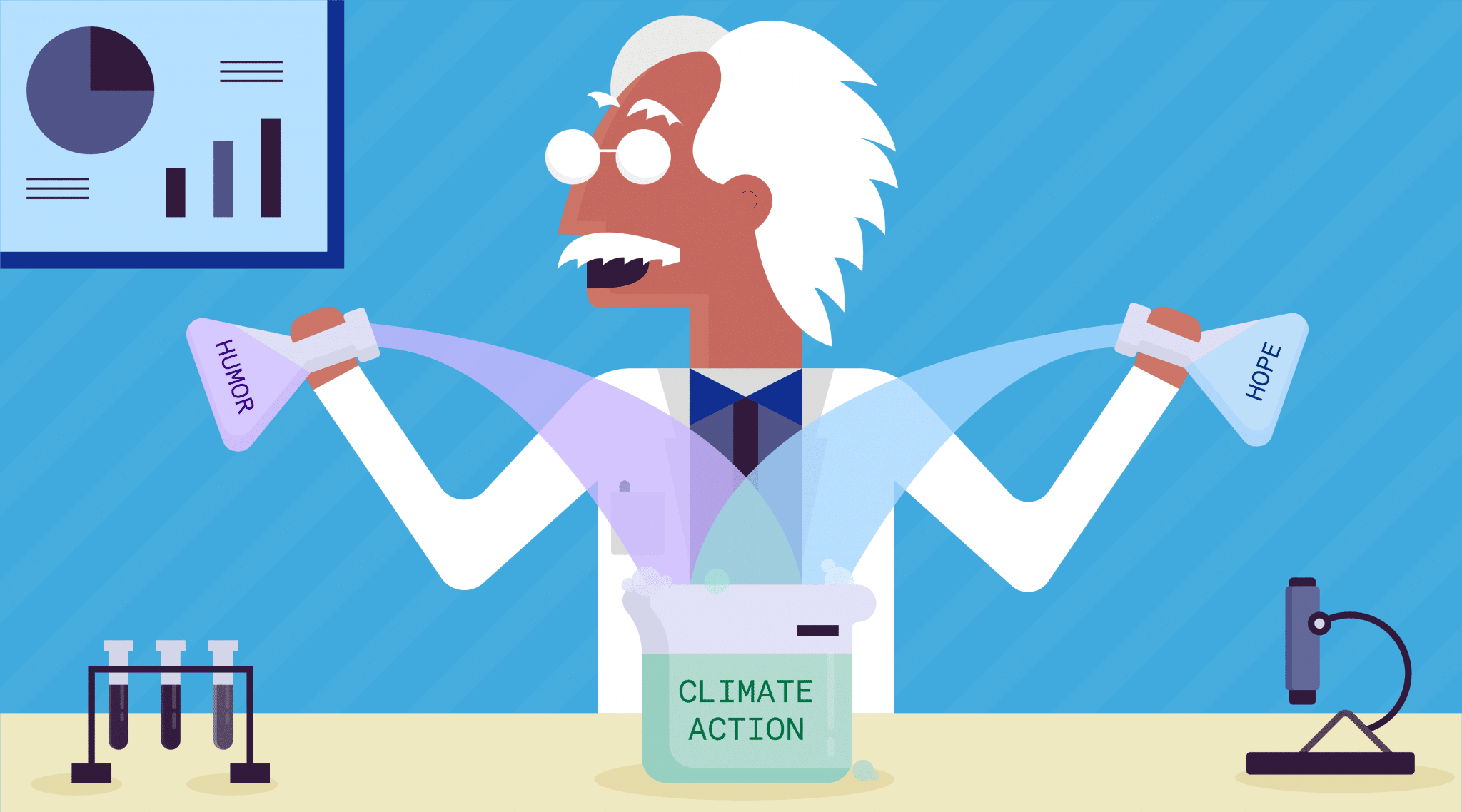As another international climate conference gets underway, it’s understandable to feel just a wee bit exhausted. Almost daily we’re bombarded by a litany of climate horrors, from wildfires in our backyards to wearying news of floods, heatwaves, and melting glaciers around the world. With all this gloom and doom, it’s no surprise that the media is reporting rising incidence of climate anxiety and eco-guilt about everything from flying in planes to having kids. All this bad news is affecting our mental well-being, contributing to existential dread and depression, particularly among young people. This psychic numbing isn’t just unhelpful, it can actually lead to paralysis in our efforts to address the climate crisis.
Fortunately, bombarding readers with mind-boggling data and the urgency of taking action aren’t the only tools in our toolbox. And they likely aren’t the best way to engage the mainstream. Studies show that narratives that rely heavily on “scientific ways of knowing” have failed to significantly engage and activate large audiences, and that gloomy interpretations actually stifle audiences rather than inspiring action. With this in mind, climate communicators have sought to adopt “smartening up” approaches that can more effectively bring people together around a divisive topic like climate change.
Enter: climate comedy
At the heart of these “new” approaches is comedy, which is actually a time-honored medium for getting people to pay attention to an issue. Humor isn’t simply a way to temporarily distract us from reality. It has wide-ranging psychological and behavioral benefits, by “bringing some light to the darkness.”
[Humor] has wide-ranging psychological and behavioral benefits, by “bringing some light to the darkness
A quick scan of the late-night comedy circuit reveals that climate change has become a hot topic, with everyone from Trevor Noah of Comedy Central’s “The Daily Show” to Jimmy Kimmel, host of ABC’s “Jimmy Kimmel Live,” seizing the opportunity to use humor to increase understanding and engagement. In 2017, former Vice President Al Gore and late-night host Steven Colbert traded dueling climate change pickup lines on “The Late Show” (Colbert: “Is that an iceberg the size of Delaware breaking off the Antarctic ice shelf, or are you just happy to see me?”). Other notable venues that have integrated climate jokes into their routines include “Saturday Night Live,” “Last Week Tonight,” “Full Frontal,” and Sarah Silverman, as well as stage shows in Los Angeles, New York City, and Austin.
Researchers, too, have sought to capitalize on the value of comedy as a form of creative climate communications. Maxwell Boykoff and Beth Osnes at the University of Colorado have done several studies on this, while also collaborating to get out humorous messages about climate change through the university’s Inside the Greenhouse projects (including “Stand Up for Climate Change,” where students write sketch comedy routines and perform them in front of live audiences). They’ve found that humor serves as an effective communications pathway for both the performers and the audience.
The genius of comedy
Comedy can influence the way we feel about (and act on) climate change. Here are a few of its advantages:
- Tapping into emotion. Comedy (as well as storytelling, art, and other media) fundamentally engages people by tapping into their emotions, including feelings like fear, despair, hope, awe, and pride. All of these play a role in how we feel and think about problems—and whether or not we’re inspired to act on them. In a recent interview with Generation180, social scientist Ezra Markowitz noted that, “We need to engage the full suite of human emotions when communicating about climate change, allowing individuals and communities to respond in the ways that are most productive and supportive of meaningful, positive action for them.” Studies have shown that greater emotional engagement, such as through humor, is associated with more change in habits.
We need to engage the full suite of human emotions when communicating about climate change
- Meeting folks “where they’re at.” Comedy also has the advantage of being a key element of popular culture, with comedians entering our psyches through everything from late-night television to hit podcasts and social media memes. Through comedy, it’s possible to bring climate stories to the masses, meeting people within their daily entertainment routines and challenging them to take on new information. As Markovitz explains, “It’s about working with your audience to identify what aspects of climate change can be integrated into their existing ways of understanding the world around them, and providing a new, yet relatable, lens through which to reassess what they know.”
- Finding common ground. Humor is also a way to break down barriers and divisions among people and find common ground. That’s why cartoons and comics are considered a universal art form, transcending language and cultural barriers through their simple graphics and straightforward messaging (often with a twist). Comedy doesn’t simply lower people’s defenses, it “temporarily suspends social rules and connects people with ideas and new ways of thinking or acting.” As Boykoff points out: “Comedy exploits cracks in arguments. It wiggles in, pokes, prods and draws attention to the incongruous, hypocritical, false and pretentious.” In doing so, it can make complex issues like climate change seem more accessible and manageable.
- Sparking reflection and evolving the conversation. Sometimes comedy can be disarming, exposing uncomfortable truths while also presenting the facts, all with a veneer of humor. In doing so, it encourages thought, reflection, and conversation about an issue that people may not otherwise engage on. In a 2018 study, Boykoff and Osnes analyzed a series of stand-up comedy shows focused on climate change, tracking how audiences responded over a three-year period. They found that climate comedy not only helps to raise awareness of climate change, but also brings an emotional element to the conversation, spurring both knowledge formation and problem solving. “Comedic approaches can influence how meanings course through the veins of our social body, shaping our coping and survival practices in contemporary life,” the researchers conclude.
- Replacing despair with hope. The light-heartedness of comedy can also bring people to their “happy place,” giving them a sense of hope (and inspiration) despite the heaviness of the world. As psychologist Susan M. Koger has noted, “if there’s no hope, then there’s no reason to take action.” In a 2019 study, Boykoff and Osnes explored how “good-natured comedy” (as opposed to satire) helps people “positively process negative emotions regarding global warming” and “sustain hope.” The researchers found that after students participated in a number of comedy workshops related to climate change, 90 percent of the participants said they felt more hopeful about climate change, and 83 percent said they felt their commitment to taking action on the issue was stronger.
If there’s no hope, then there’s no reason to take action
Overall, these findings suggest that comedy provides a way for participants to “process emotions that allow joy, fun, and hope to sustain their commitment to grow as climate communicators.” Moreover, the students reported that “flipping the script” on climate change—from doom and gloom to comedy—could also help others feel more empowered to take action. Ultimately, the goal of climate comedy (and similar creative communications) should be to “pair crisis narratives with solutions,” particularly by offering practical, meaningful pathways to action. As writer Nina Pullano concluded in a recent article: “Comedy won’t fix the climate crisis, to be sure. But in these trying times, it might be a key ingredient in helping us cope with the challenges—and respond to them.”
What to do…what to do…

Quick poll: even though the data seems to show its potential, does anyone think that humor has been leveraged enough in climate communications to date? We certainly don’t think so, and we’re ready to do something about it. Generation180 is thrilled to announce our brand-new podcast, Comedians Conquering Climate Change. It’s the funniest, most accessible, and shortest podcast addressing today’s critical climate and clean energy topics. Each week join comedian, writer, and teacher Esteban Gast as he enlists the help of fellow comedians to single-handedly save the planet.
Listen to our first episode below and subscribe on all of your favorite podcast services.














